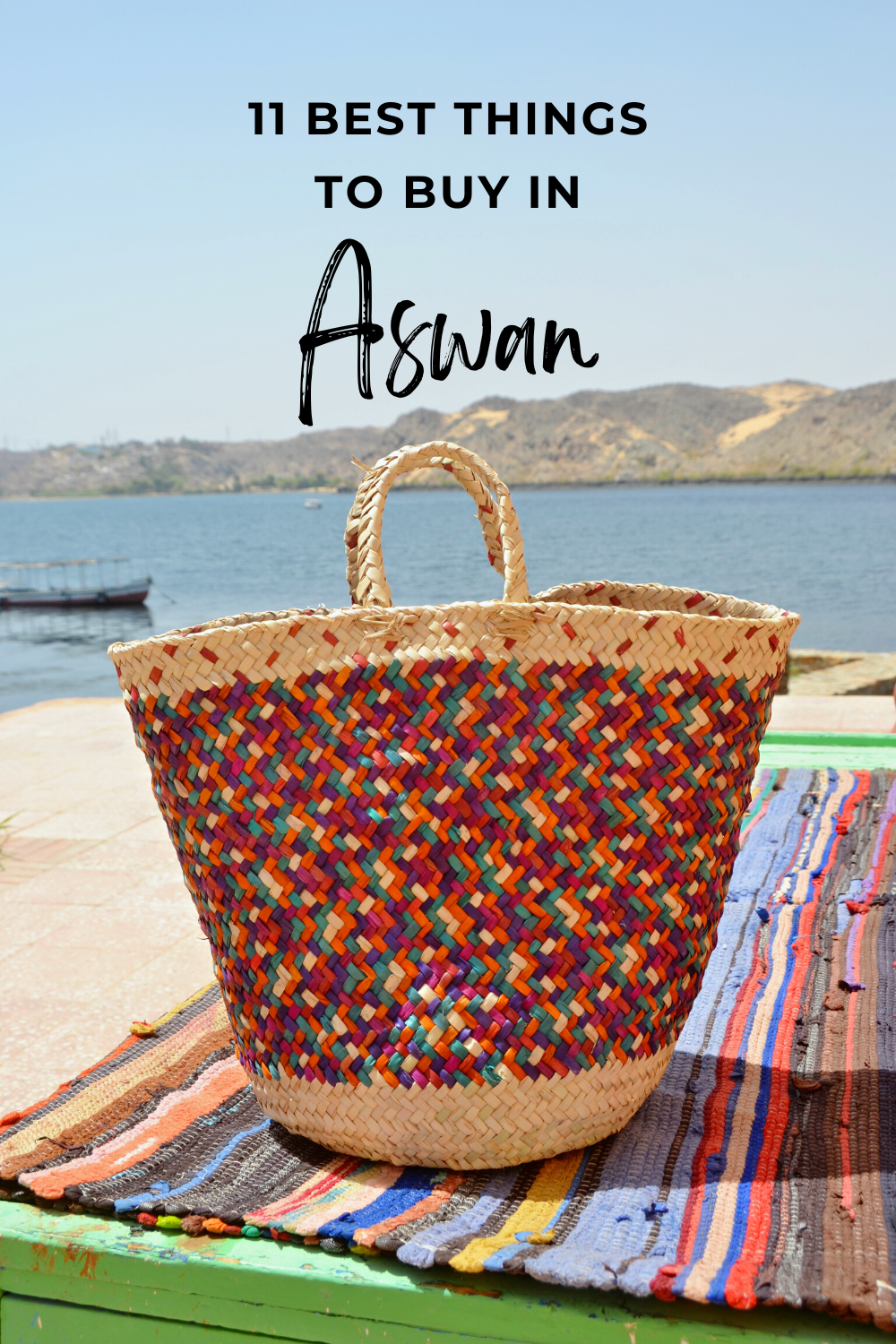11 Best Things To Buy In Aswan (A Local’s Guide)
10 min readAswan is famous for its colorful handicrafts – and items you won’t find anywhere else in Egypt. Here’s my ultimate guide to the best things to buy in Aswan. From blue alabaster bowls and beaded jewelry to wooden dolls in colorful dress, Aswan has some of the most creative artisans in the country. I’m a longtime expat living in Egypt and Aswan is one of my favorite places to shop for handmade and authentic souvenirs. The markets in Aswan aren’t as flooded with Chinese fakes as some other places in Egypt. And they have a more chilled vibe where you’re free to shop without aggressive haggling. Browse the market stalls in Aswan to discover crafts that reflect the local Nubian culture. Or pick up some fun souvenirs that are more recent innovations – like wooden crocodiles. The Nubian people (an ethnic group who live in southern Egypt and northern Sudan) are some of the most kind people you’ll meet. They have their own language, culture and craft traditions– and they’re considered one of Africa’s oldest indigenous groups. This rich Nubian culture is well worth exploring in the souqs of Aswan. So whatever your taste, set aside some time for shopping on your Aswan itinerary for these unique handmade souvenirs. The story of Aswan handicrafts (photo: Khaled Basyouny, CC BY-SA 4.0, via Wikimedia Commons) Aswan has a long history as a city of handicrafts and bustling commerce. In Ancient Egypt, this Nile-side gem was known as sono, or “market,” and thrived as a commercial center that welcomed traders going to and from Nubia. It was known as the Land of Gold and provided much of the gold and stone that adorned Ancient Egyptian temples. Aswan was called “the gateway to Africa” because it connected Egypt with traders from the rest of the continent. Today you’ll find items like wooden masks and giraffe statues at local souqs that testify to the city’s link with broader African culture. Aswan has a rich heritage of folk arts that include beadwork, palm branch and leaf creations and needlework. You’ll still see traditional clothing and jewelry worn at local weddings, funerals and celebrations. Aswan is a UNESCO Creative City of Crafts and Folk Art, and boasts some 50 traditional folk dances, unique jewelry and original handicrafts. You’ll see this rich culture on display at the Aswan Museum and the Nubian Museum, which have departments that focus on preserving folk art from Aswan. The people of Aswan overcame numerous obstacles to keep their local traditions alive, including the construction of the High Dam that flooded many Nubian monuments in the 1960s and left their heritage sunken under the Nile. Today there are continual efforts to preserve local handicrafts and empower Aswan’s communities. Where to shop in Aswan Start at the souq at the marina on your way to Philae Temple (shown above) for some great finds laid out on the docks. They include piles of statement jewelry and rings, carved wooden Bastet statues and handpainted bowls. And don’t miss Sharia el Souq, a bustling downtown market with a more laidback vibe than many of Egypt’s more hectic tourist bazaars. Wander down the sidestreets to uncover some unusual finds like Sudanese swords, stuffed crocodiles, wooden African masks, Nubian talismans and colorful caps and baskets handmade by Aswan women. Here are the best things to buy in Aswan: 1. Baskets Aswan is known for its multi-color baskets woven by local women and sold across the city’s bustling souqs. Aswan baskets are made from either doum palm leaves or date palm leaves, which are taken off the trees and dried. The baskets are a centuries-old craft that finds use for leaves that would otherwise go discarded. The leaves are dyed to produce vibrant colors like canary yellow, green and deep red. Local women then weave the leaves together in multi-colored patters and bold stripes. Insider’s tip: Aswan baskets have round bottoms that don’t fold easily into luggage. Use your Aswan basket as a carry-on bag and place your handbag inside. Most baskets fit easily under a plane seat or in the overhead compartment. “Nubian women are artists by nature; they are the ones who decorate the facades of their homes with drawings and decorations depicting trees, birds, crescents and stars. They are also very clever at weaving straw and reeds of bright colors into artistically interwoven triangles and squares, shaping them into platters or concave dishes for serving popcorn and dates to guests.” – Azza Fahmy, Enchanted Jewelry of Egypt The baskets are largely woven by women in Naga’a Ghalalab, just west of Aswan, and are widely popular in the city’s markets. You’ll find the best variety and selection of these baskets right in Aswan. Fair Trade Egypt also has a great selection of Aswan baskets (shown above) at their shops in Cairo with locations in Zamalek and Heliopolis. They source the baskets directly from workshops run by Aswan women who are paid fairly for their work. 2. Nubian caps These colorful woven caps are traditionally worn by Nubian men – and they make for vibrant souvenirs from Aswan. Add them to your wardrobe for a great boho accessory or display them for a pop of color in an eclectic home. Every young Nubian girl is taught the art of weaving these caps for her love interest, husband or male family members. Hand-woven by local women in a myriad of patterns, these caps are distinctly Nubian and combine bright colors and geometric shapes, flowers and birds to create an endless variety of designs. They’re either cotton, which are commonly worn in summer, or thicker wool, usually worn in the winter. Such caps – or taqiya – are worn widely across Upper Egypt. The typical Upper Egyptian taqiya is white, while the Nubian versions are more colorful. 3. Dry hibiscus Sip on some iced karkadai to cool down after exploring Aswan’s dusty temples – and load up on the dried hibiscus flowers to make your own hibiscus at home. Aswan is famous for the quality of its hibiscus. And you’ll find this popular drink everywhere from the cafe at Philae Temple to the stalls of Sharia el Souq. Hibiscus is harvested every year in November with many young local men pitching in to the collective effort. The vibrant red flowers are picked off the branches. Then local women peel the flower petals off the seed pods and spread the petals out on their rooftops in the direct sun for drying. The dried petals are then ready and packaged for sale. Hibiscus is very cooling in the hot Aswan summers and a great drink for blood pressure. It’s also easy to make at home by soaking the dried hibiscus flowers in water or boiling them. Serve the drink hot or ice cold, depending on your taste. Hibiscus also makes a great gift for loved ones back home. Pack some dried hibiscus into decorative jars to gift friends and family. 4. Nubian dolls These adorable wooden dolls are sold across Nubian villages in Aswan and offer playful portraits of the local people and their daily life. The female dolls wear giant hoop earrings and colorful floral dresses as they balance bowls of rice on their heads. The male dolls wear traditional galabeyas and often have a characteristic hat or mustache. The Nubian dolls have darker complexions than their Upper Egyptian counterparts. And they’re made to depict scenes of everyday Nubian life – from farmers tilling their fields to women carrying baskets of grain or jugs of water from the Nile. The handpainted dolls pack easily and make for great souvenirs, gifts for children and last-minute presents for loved ones back home. 5. Wooden crocodiles Wooden crocodile are a fun souvenir sold across Aswan that testify to the region’s deep affinity with the Nile animal. The Nile crocodile played an important role in Ancient Egyptian culture – and the animal is still significant today in Nubian traditions. At the nearby Temple of Kom Ombo, the crocodile god Sobek was worshiped as a deity associated with pharaonic power, fertility and military prowess. It was believed Sobek rose from primeval waters and created the Nile River from his sweat. Crocodiles were mummified in ancient times and offered as sacrifices to Sobek. You can view dozens such crocodile mummies today at the Kom Ombo Crocodile Museum. But the crocodiles that once basked on the ancient river banks all migrated south after the construction of the High Dam. Today, stuffed crocodiles adorn the doorways of homes in the Nubian village. And the cute wooden crocodiles are the latest incarnation of the region’s fascination with the king of the Nile. 6. Woodwork From elaborate African masks to tiny animal figurines, Aswan’s markets are filled with woodwork that’s carved and painted locally by generations of men. You’ll find wooden bowls with leaning giraffes carved into the side – though this African animal has never been native to Aswan. Other items include masks carved into an array of expressions. And don’t miss the huge array of wooden animal figurines from the ever-illusive giraffe and rhinoceros to the more locally common cat, donkey and camel. 7. Pharaonic style jewelry Egypt offers lots of jewelry with Ancient Egyptian themes from ankh rings and amulets to thick Cleopatra-style necklaces. Some jewelry is more authentic than others. And pieces at Aswan’s souqs range from handcrafted items to cheap Made in China dupes. Shop the stalls at the marina on your way to Philae Temple for bargain brass jewelry, especially rings with the figure of Isis (the chief deity at Philae). And if you’re looking for gold, Egypt has some of the most affordable prices in the world. Head to Hanafi Bazaar for 18-carat gold jewelry and custom cartouche necklaces. Shop only at well-established retailers and make sure you get a receipt with the weight of the gold and a certificate of authenticity. 8. Colored alabaster From pastel blue to deep raspberry, Aswan boasts an array of colored alabaster bowls, platters and animal figurines. Much of the alabaster comes from Luxor then it’s brought into Aswan and sold across local souqs. Original alabaster comes in shades that range from light to deep yellow, with natural swirls running through the rock. It’s cut and smoothed by machine into an array of objects. Colored alabaster is either blue or maroon. It’s made with alabaster that’s been dyed with artificial color – so individual pieces vary widely. The colored alabaster is NOT food safe, however. The blue and maroon items are decorative and can be used to hold potpourri, jewelry, cosmetics, etc. 9. Pouches These vibrant pouches make adorable Aswan souvenirs. And they’re practical too – use them to store phone chargers, makeup or anything else floating around loose in your purse. Aswan pouches are made with dried palm leaves and use materials that would otherwise get discarded after harvest. Local women dye the palm leaves into vibrant colors and then weave them into circular and half-moon pouches. The Nile around Aswan is known for its luscious plants and palm groves. And these abundant crops, trees and palms have been used in local folk crafts since pre-pharaonic times. The palm tree is widely used in Nubian culture to create anything from wicker furniture and wall hangings to floor mats and baskets. Almost every scrap of the palm tree is utilized. And these crafts often involve the entire family as Nubian children (especially girls) learn the skills from their mothers. But these days handicrafts in Aswan are under threat amid the influx of cheap Chinese-made souvenirs. Young people rarely want to become craftsmen as they don’t believe the profession is reliable enough to make a decent living. Though various initiatives aim to keep these traditions alive. And groups of elderly women still weave the vibrant palm leaves together into a myriad of creations. 10. Bead necklaces Nubia is well-known for its bold, geometric jewelry – and you’ll find many locally-made pieces at local markets and upscale boutiques. Nubian jewelry is a...
The post 11 Best Things To Buy In Aswan (A Local’s Guide) appeared first on Vanilla Papers.
Aswan is famous for its colorful handicrafts – and items you won’t find anywhere else in Egypt. Here’s my ultimate guide to the best things to buy in Aswan.
From blue alabaster bowls and beaded jewelry to wooden dolls in colorful dress, Aswan has some of the most creative artisans in the country.
I’m a longtime expat living in Egypt and Aswan is one of my favorite places to shop for handmade and authentic souvenirs.
The markets in Aswan aren’t as flooded with Chinese fakes as some other places in Egypt. And they have a more chilled vibe where you’re free to shop without aggressive haggling.
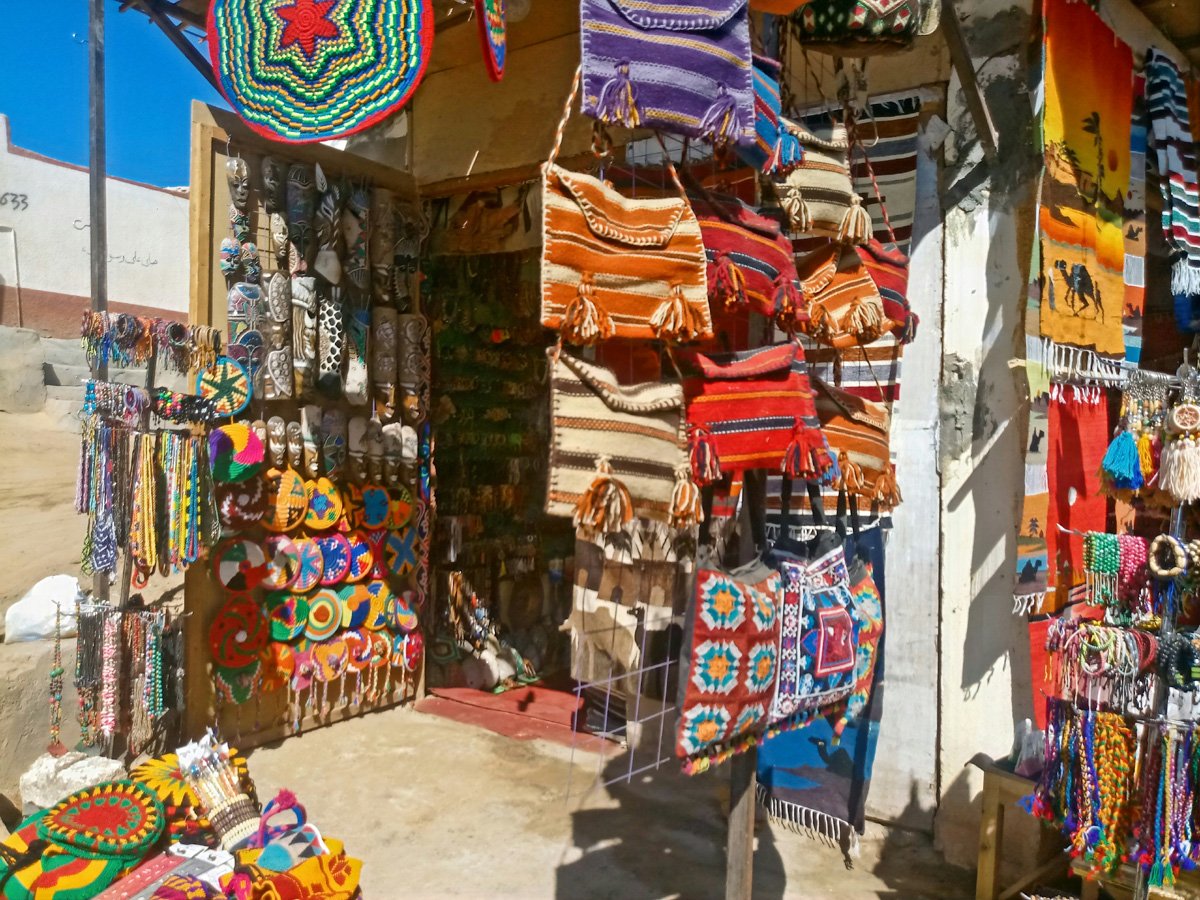

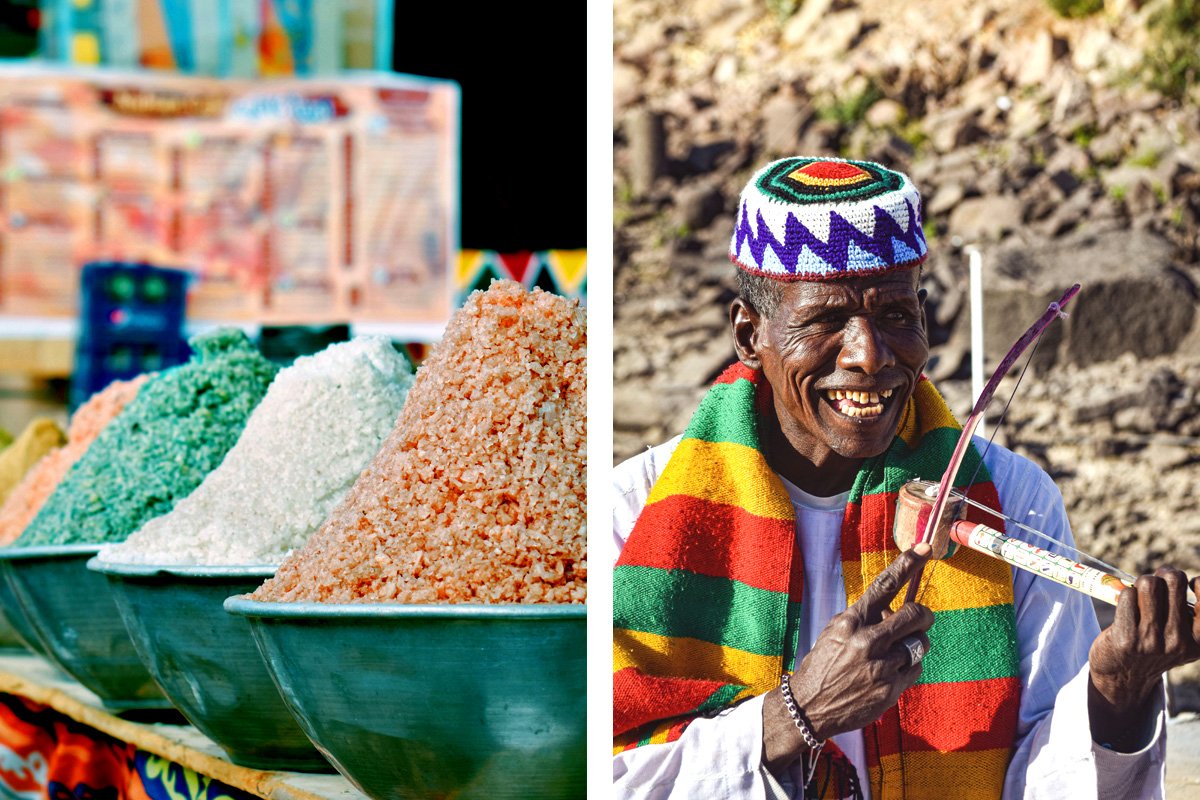

Browse the market stalls in Aswan to discover crafts that reflect the local Nubian culture. Or pick up some fun souvenirs that are more recent innovations – like wooden crocodiles.
The Nubian people (an ethnic group who live in southern Egypt and northern Sudan) are some of the most kind people you’ll meet. They have their own language, culture and craft traditions– and they’re considered one of Africa’s oldest indigenous groups.
This rich Nubian culture is well worth exploring in the souqs of Aswan.
So whatever your taste, set aside some time for shopping on your Aswan itinerary for these unique handmade souvenirs.
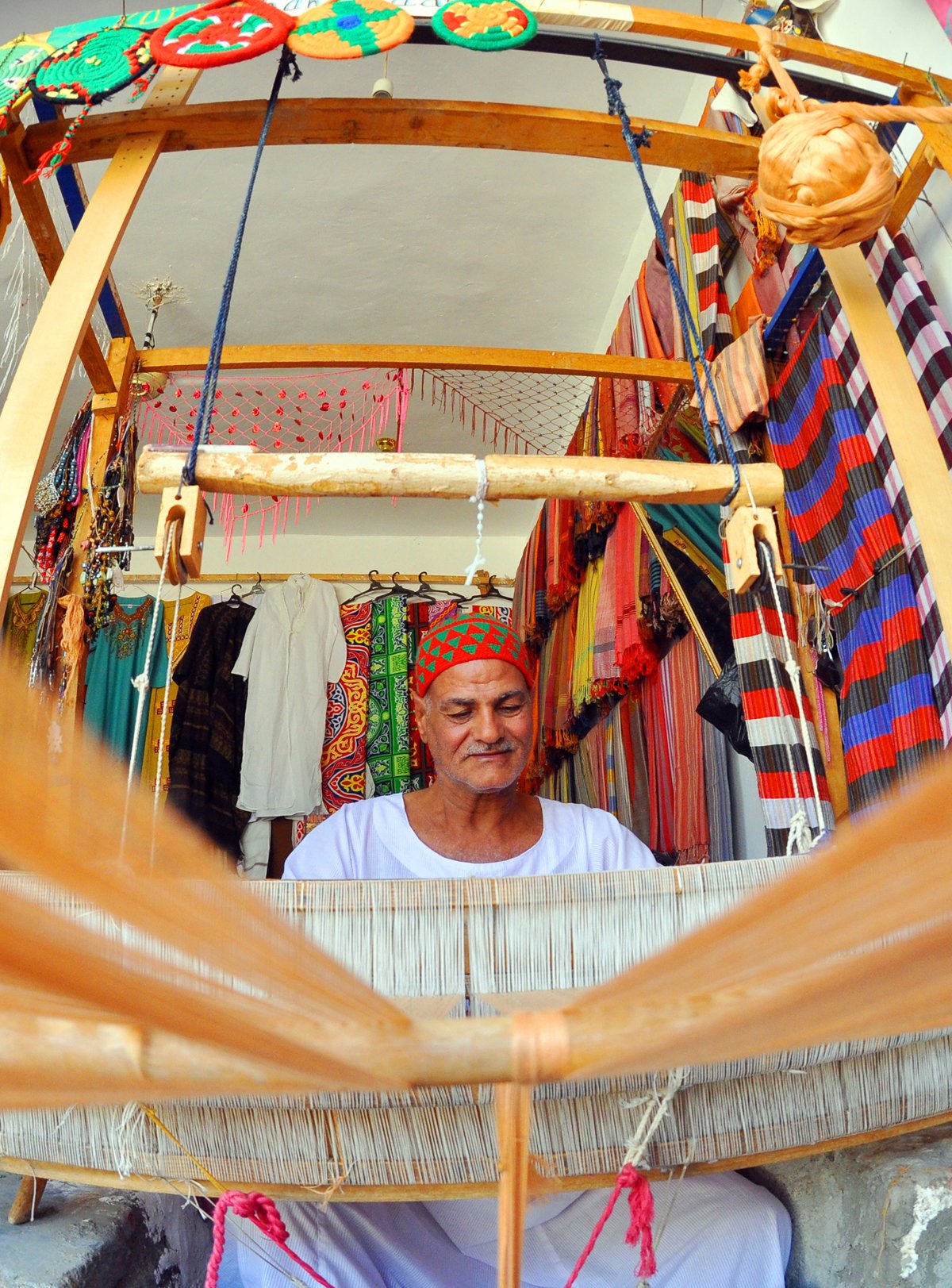

(photo: Khaled Basyouny, CC BY-SA 4.0, via Wikimedia Commons)
Aswan has a long history as a city of handicrafts and bustling commerce.
In Ancient Egypt, this Nile-side gem was known as sono, or “market,” and thrived as a commercial center that welcomed traders going to and from Nubia. It was known as the Land of Gold and provided much of the gold and stone that adorned Ancient Egyptian temples.
Aswan was called “the gateway to Africa” because it connected Egypt with traders from the rest of the continent.
Today you’ll find items like wooden masks and giraffe statues at local souqs that testify to the city’s link with broader African culture.
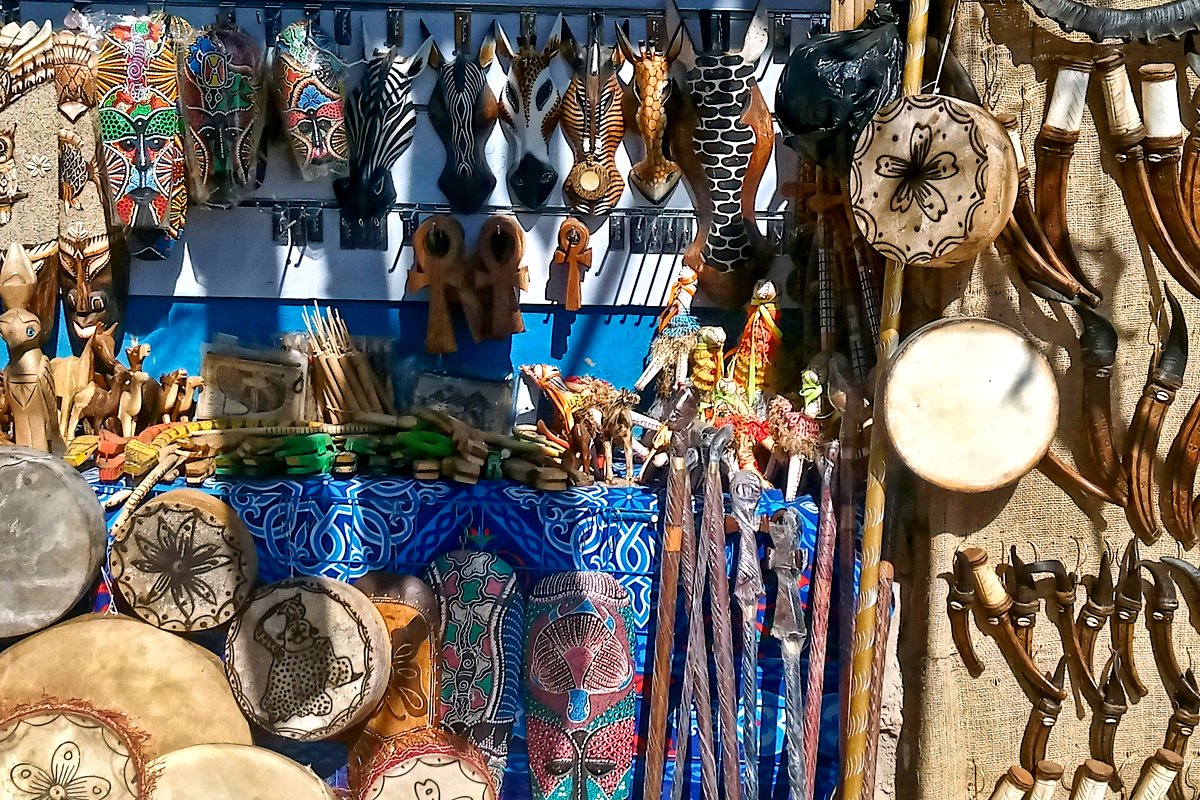

Aswan has a rich heritage of folk arts that include beadwork, palm branch and leaf creations and needlework. You’ll still see traditional clothing and jewelry worn at local weddings, funerals and celebrations.
Aswan is a UNESCO Creative City of Crafts and Folk Art, and boasts some 50 traditional folk dances, unique jewelry and original handicrafts. You’ll see this rich culture on display at the Aswan Museum and the Nubian Museum, which have departments that focus on preserving folk art from Aswan.
The people of Aswan overcame numerous obstacles to keep their local traditions alive, including the construction of the High Dam that flooded many Nubian monuments in the 1960s and left their heritage sunken under the Nile.
Today there are continual efforts to preserve local handicrafts and empower Aswan’s communities.
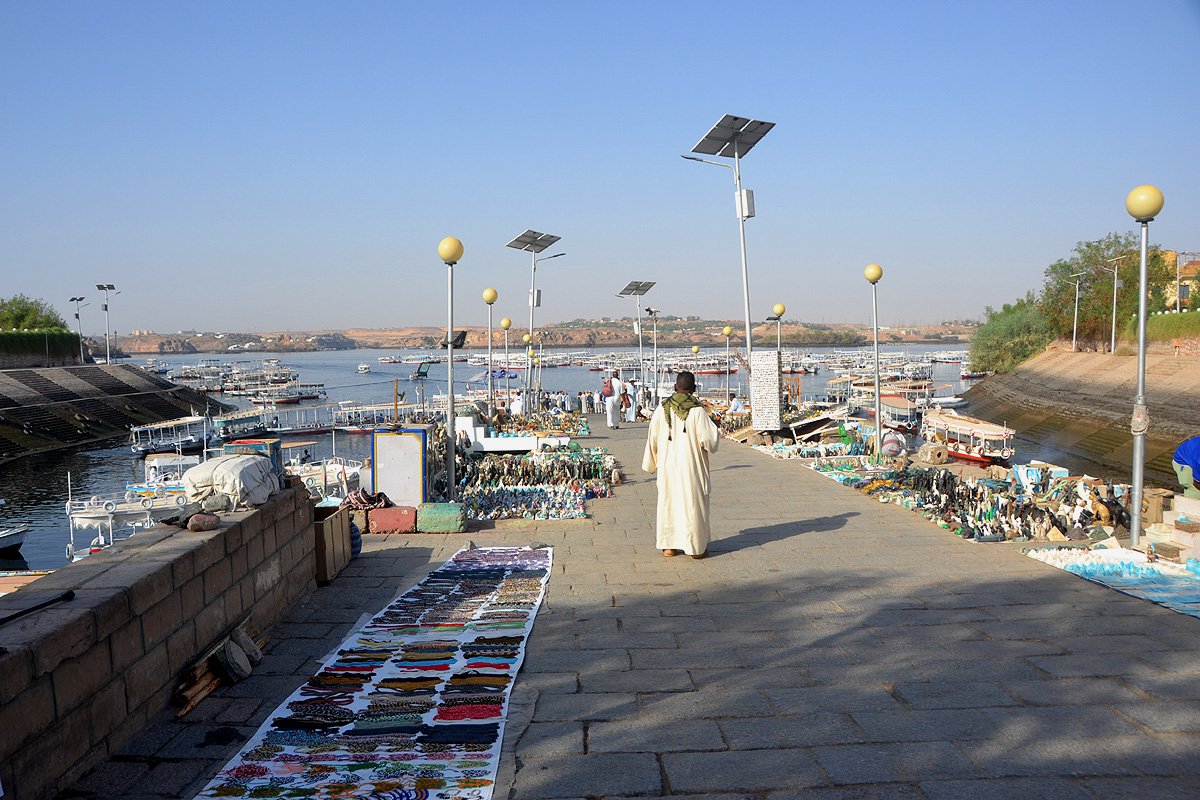

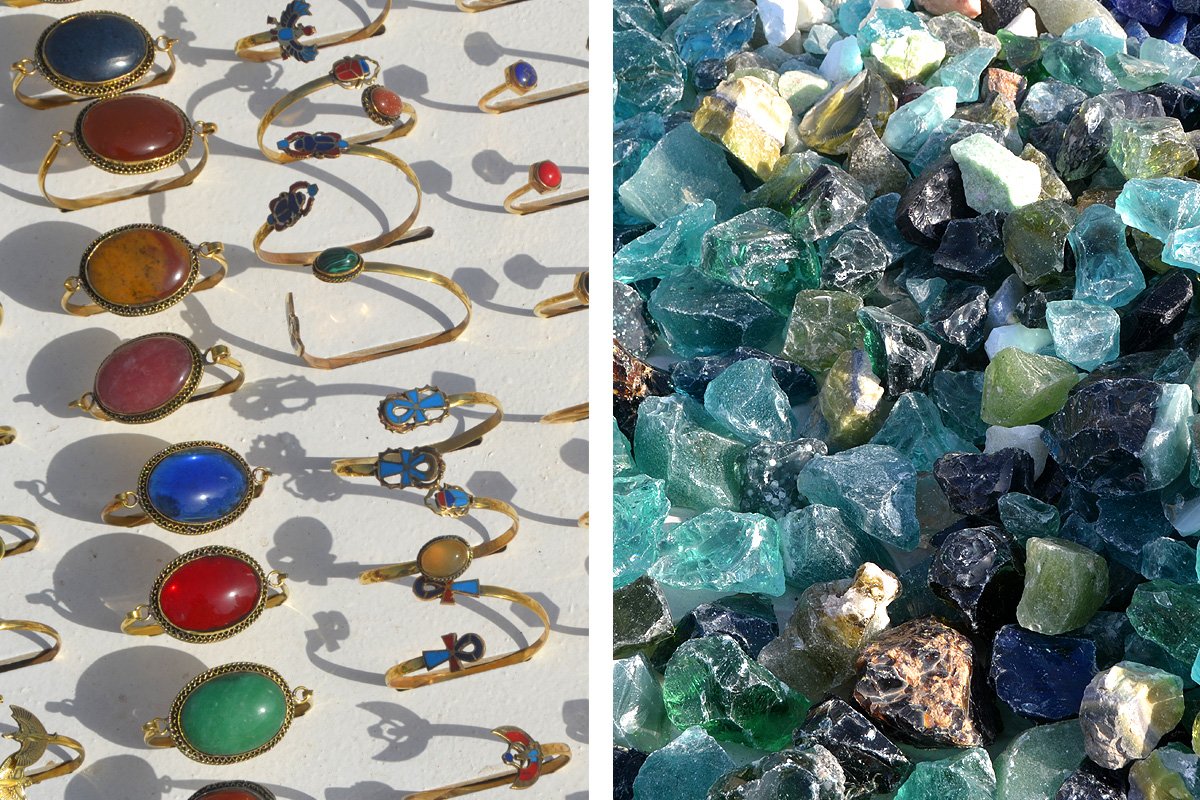

Start at the souq at the marina on your way to Philae Temple (shown above) for some great finds laid out on the docks. They include piles of statement jewelry and rings, carved wooden Bastet statues and handpainted bowls.
And don’t miss Sharia el Souq, a bustling downtown market with a more laidback vibe than many of Egypt’s more hectic tourist bazaars.
Wander down the sidestreets to uncover some unusual finds like Sudanese swords, stuffed crocodiles, wooden African masks, Nubian talismans and colorful caps and baskets handmade by Aswan women.
1. Baskets
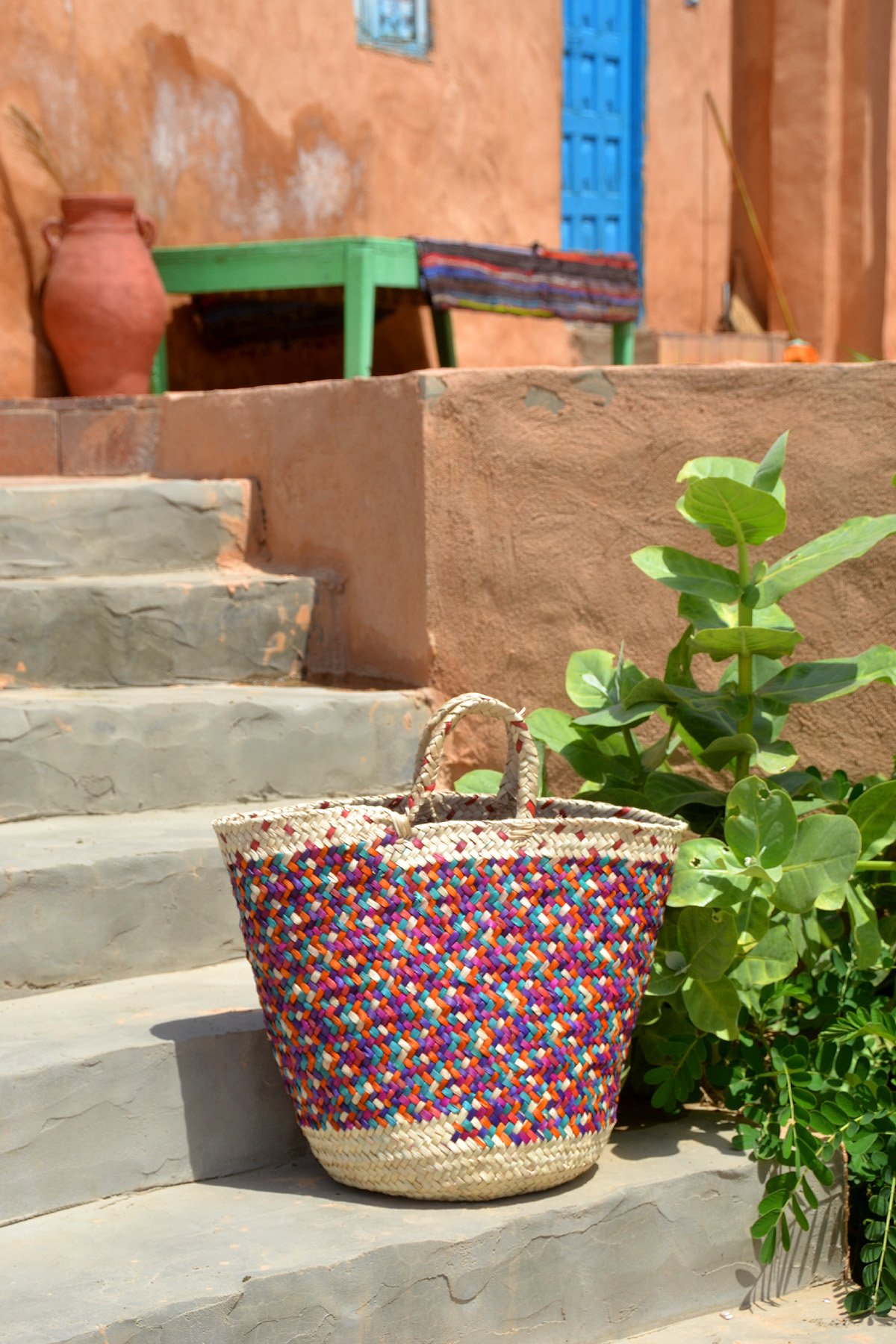

Aswan is known for its multi-color baskets woven by local women and sold across the city’s bustling souqs.
Aswan baskets are made from either doum palm leaves or date palm leaves, which are taken off the trees and dried. The baskets are a centuries-old craft that finds use for leaves that would otherwise go discarded.
The leaves are dyed to produce vibrant colors like canary yellow, green and deep red. Local women then weave the leaves together in multi-colored patters and bold stripes.
Insider’s tip: Aswan baskets have round bottoms that don’t fold easily into luggage. Use your Aswan basket as a carry-on bag and place your handbag inside. Most baskets fit easily under a plane seat or in the overhead compartment.
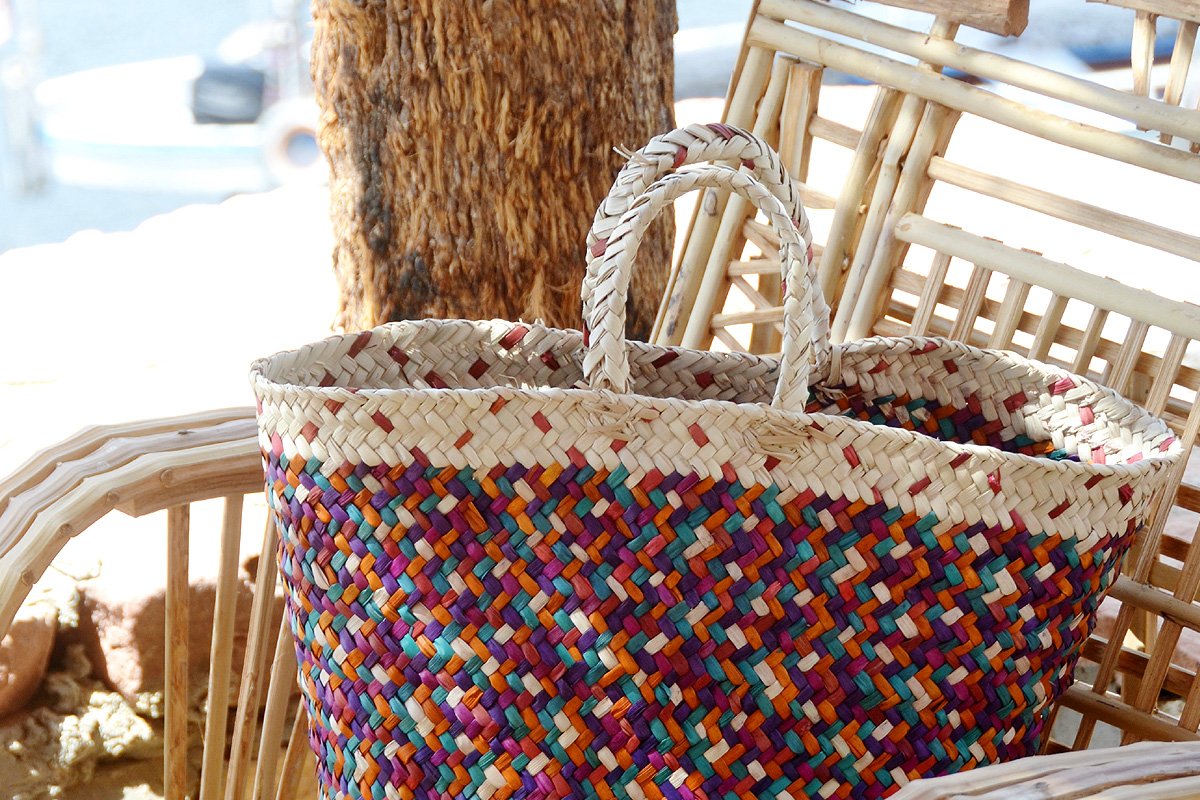

“Nubian women are artists by nature; they are the ones who decorate the facades of their homes with drawings and decorations depicting trees, birds, crescents and stars. They are also very clever at weaving straw and reeds of bright colors into artistically interwoven triangles and squares, shaping them into platters or concave dishes for serving popcorn and dates to guests.” – Azza Fahmy, Enchanted Jewelry of Egypt
The baskets are largely woven by women in Naga’a Ghalalab, just west of Aswan, and are widely popular in the city’s markets.
You’ll find the best variety and selection of these baskets right in Aswan.
Fair Trade Egypt also has a great selection of Aswan baskets (shown above) at their shops in Cairo with locations in Zamalek and Heliopolis. They source the baskets directly from workshops run by Aswan women who are paid fairly for their work.
2. Nubian caps
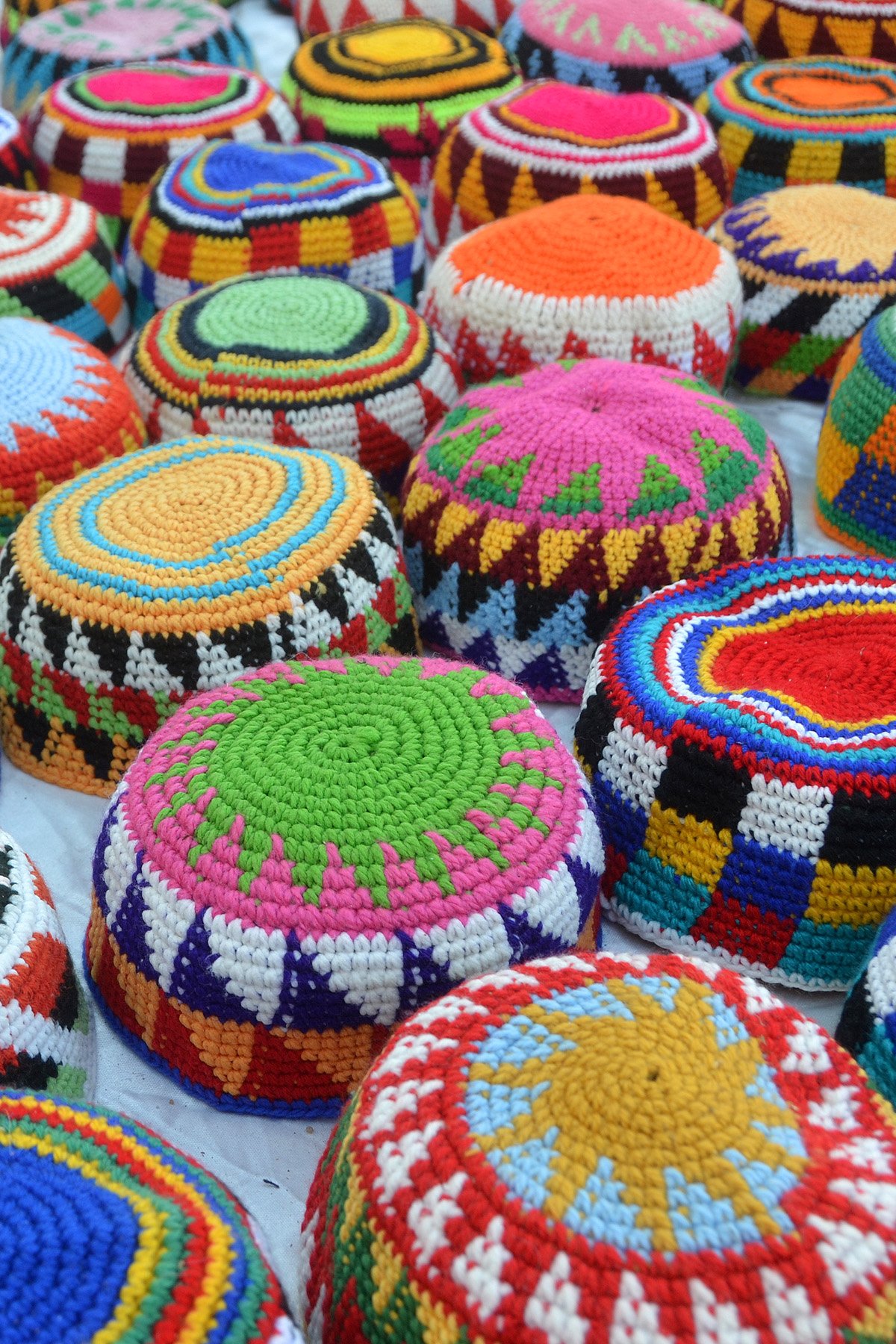

These colorful woven caps are traditionally worn by Nubian men – and they make for vibrant souvenirs from Aswan.
Add them to your wardrobe for a great boho accessory or display them for a pop of color in an eclectic home.
Every young Nubian girl is taught the art of weaving these caps for her love interest, husband or male family members.
Hand-woven by local women in a myriad of patterns, these caps are distinctly Nubian and combine bright colors and geometric shapes, flowers and birds to create an endless variety of designs. They’re either cotton, which are commonly worn in summer, or thicker wool, usually worn in the winter.
Such caps – or taqiya – are worn widely across Upper Egypt. The typical Upper Egyptian taqiya is white, while the Nubian versions are more colorful.
3. Dry hibiscus
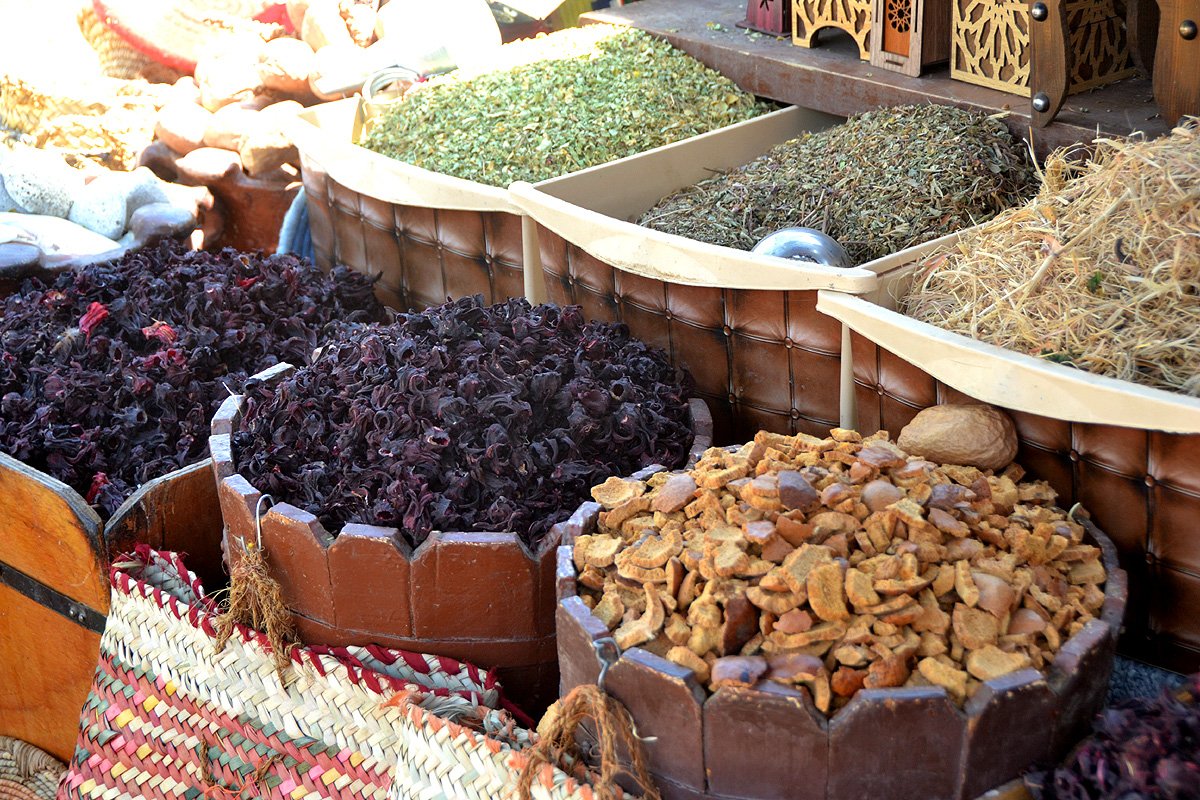

Sip on some iced karkadai to cool down after exploring Aswan’s dusty temples – and load up on the dried hibiscus flowers to make your own hibiscus at home.
Aswan is famous for the quality of its hibiscus. And you’ll find this popular drink everywhere from the cafe at Philae Temple to the stalls of Sharia el Souq.
Hibiscus is harvested every year in November with many young local men pitching in to the collective effort. The vibrant red flowers are picked off the branches.
Then local women peel the flower petals off the seed pods and spread the petals out on their rooftops in the direct sun for drying. The dried petals are then ready and packaged for sale.
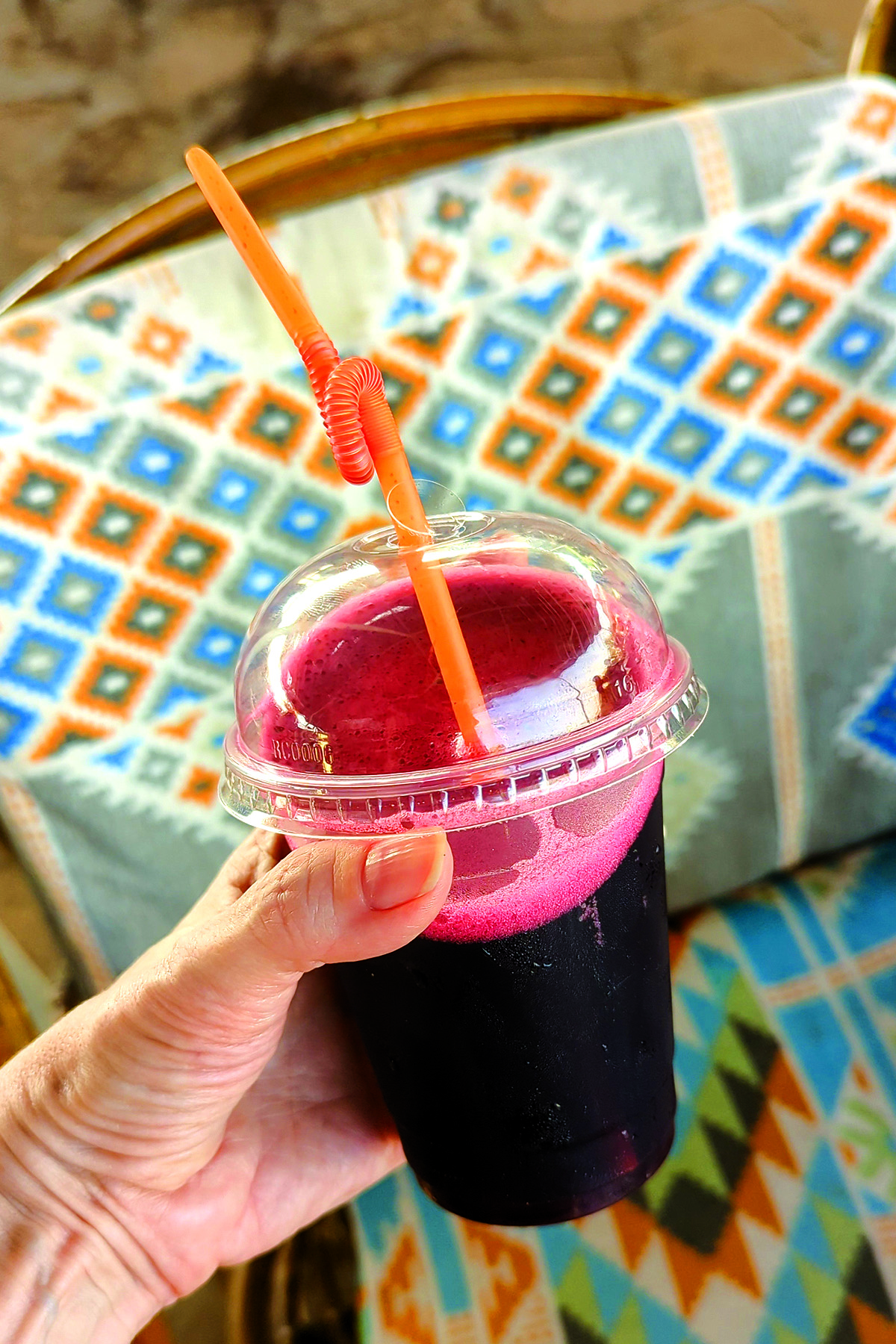

Hibiscus is very cooling in the hot Aswan summers and a great drink for blood pressure. It’s also easy to make at home by soaking the dried hibiscus flowers in water or boiling them. Serve the drink hot or ice cold, depending on your taste.
Hibiscus also makes a great gift for loved ones back home. Pack some dried hibiscus into decorative jars to gift friends and family.
4. Nubian dolls
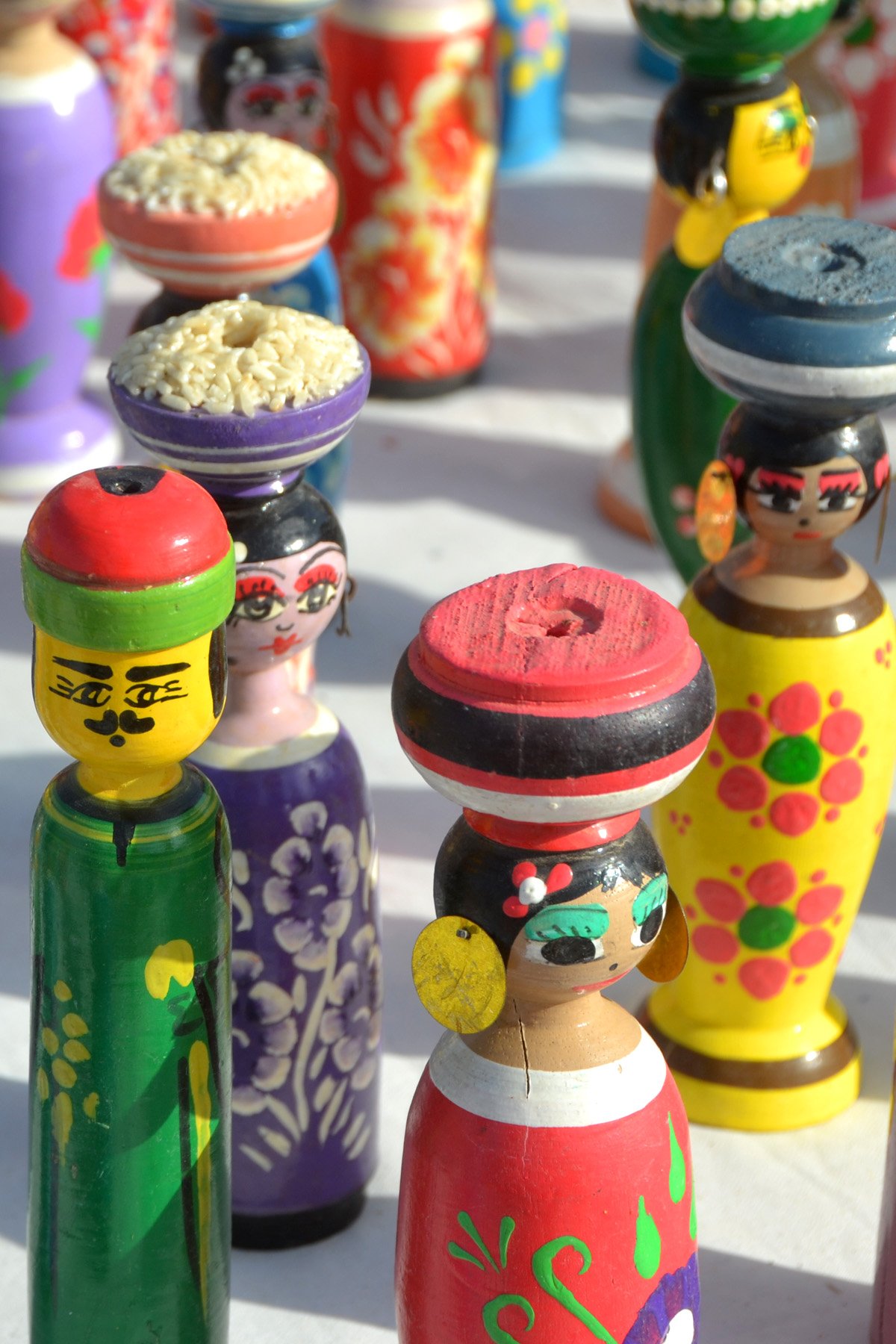

These adorable wooden dolls are sold across Nubian villages in Aswan and offer playful portraits of the local people and their daily life.
The female dolls wear giant hoop earrings and colorful floral dresses as they balance bowls of rice on their heads. The male dolls wear traditional galabeyas and often have a characteristic hat or mustache.
The Nubian dolls have darker complexions than their Upper Egyptian counterparts. And they’re made to depict scenes of everyday Nubian life – from farmers tilling their fields to women carrying baskets of grain or jugs of water from the Nile.
The handpainted dolls pack easily and make for great souvenirs, gifts for children and last-minute presents for loved ones back home.
5. Wooden crocodiles
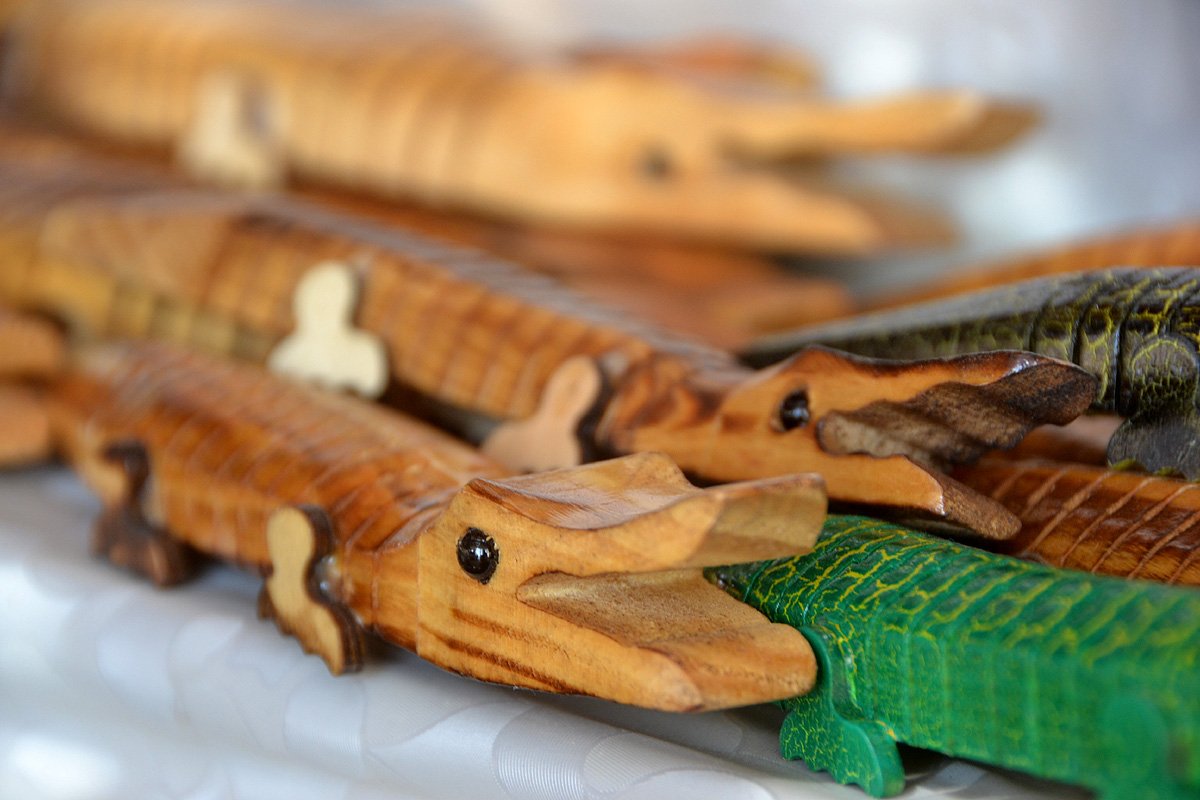

Wooden crocodile are a fun souvenir sold across Aswan that testify to the region’s deep affinity with the Nile animal.
The Nile crocodile played an important role in Ancient Egyptian culture – and the animal is still significant today in Nubian traditions.
At the nearby Temple of Kom Ombo, the crocodile god Sobek was worshiped as a deity associated with pharaonic power, fertility and military prowess. It was believed Sobek rose from primeval waters and created the Nile River from his sweat.
Crocodiles were mummified in ancient times and offered as sacrifices to Sobek. You can view dozens such crocodile mummies today at the Kom Ombo Crocodile Museum.
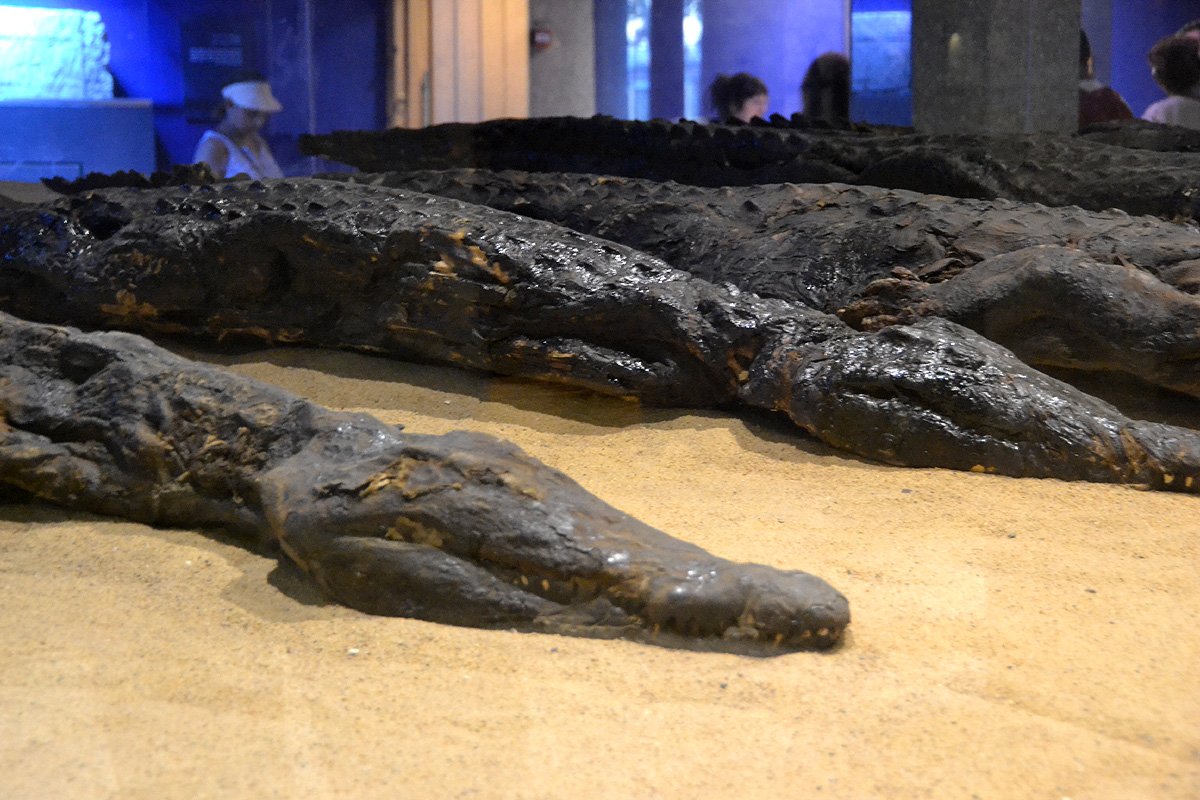

But the crocodiles that once basked on the ancient river banks all migrated south after the construction of the High Dam.
Today, stuffed crocodiles adorn the doorways of homes in the Nubian village.
And the cute wooden crocodiles are the latest incarnation of the region’s fascination with the king of the Nile.
6. Woodwork
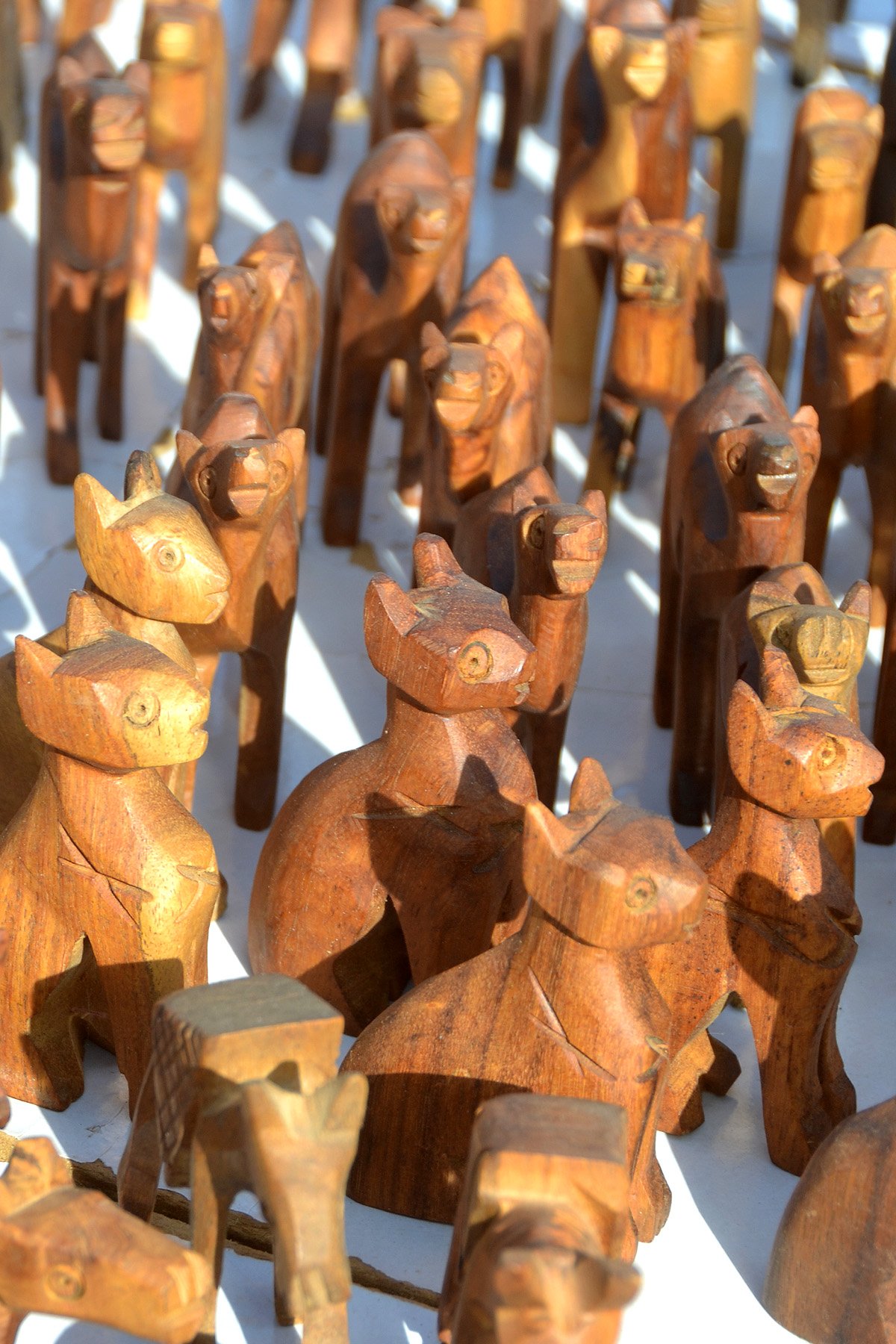

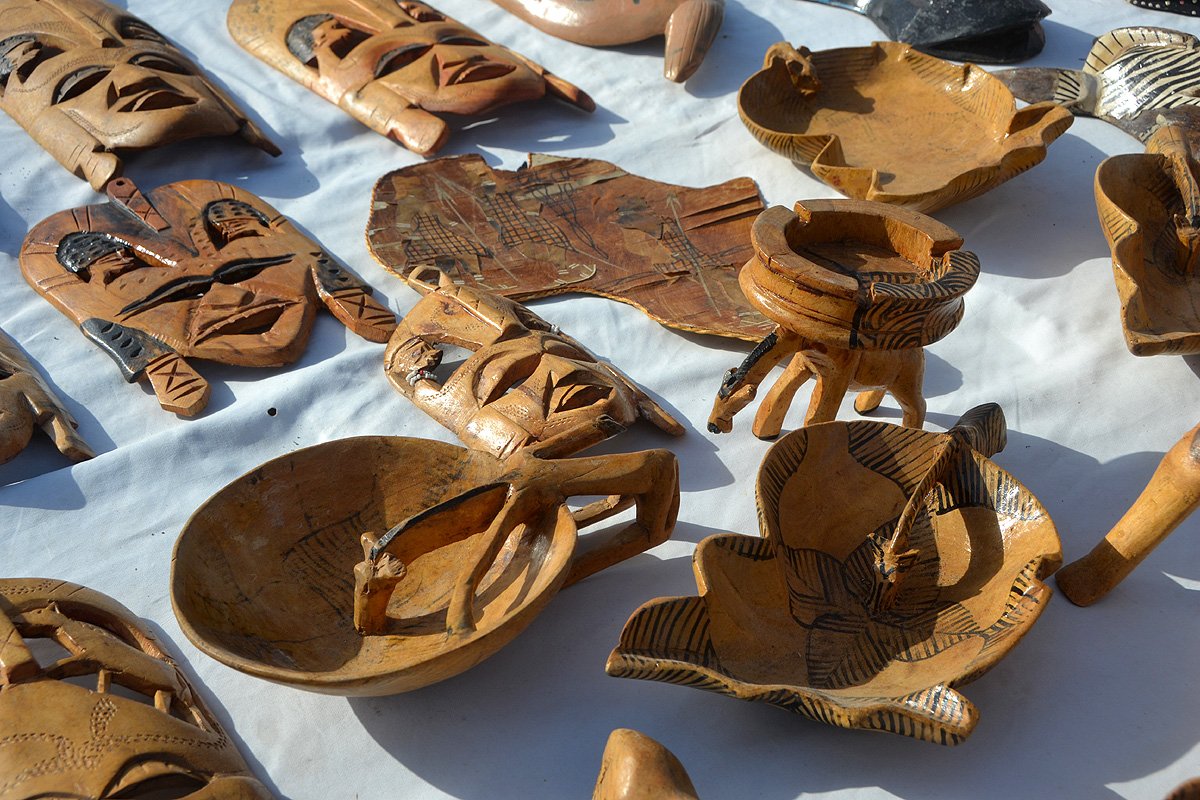

From elaborate African masks to tiny animal figurines, Aswan’s markets are filled with woodwork that’s carved and painted locally by generations of men.
You’ll find wooden bowls with leaning giraffes carved into the side – though this African animal has never been native to Aswan. Other items include masks carved into an array of expressions.
And don’t miss the huge array of wooden animal figurines from the ever-illusive giraffe and rhinoceros to the more locally common cat, donkey and camel.
7. Pharaonic style jewelry
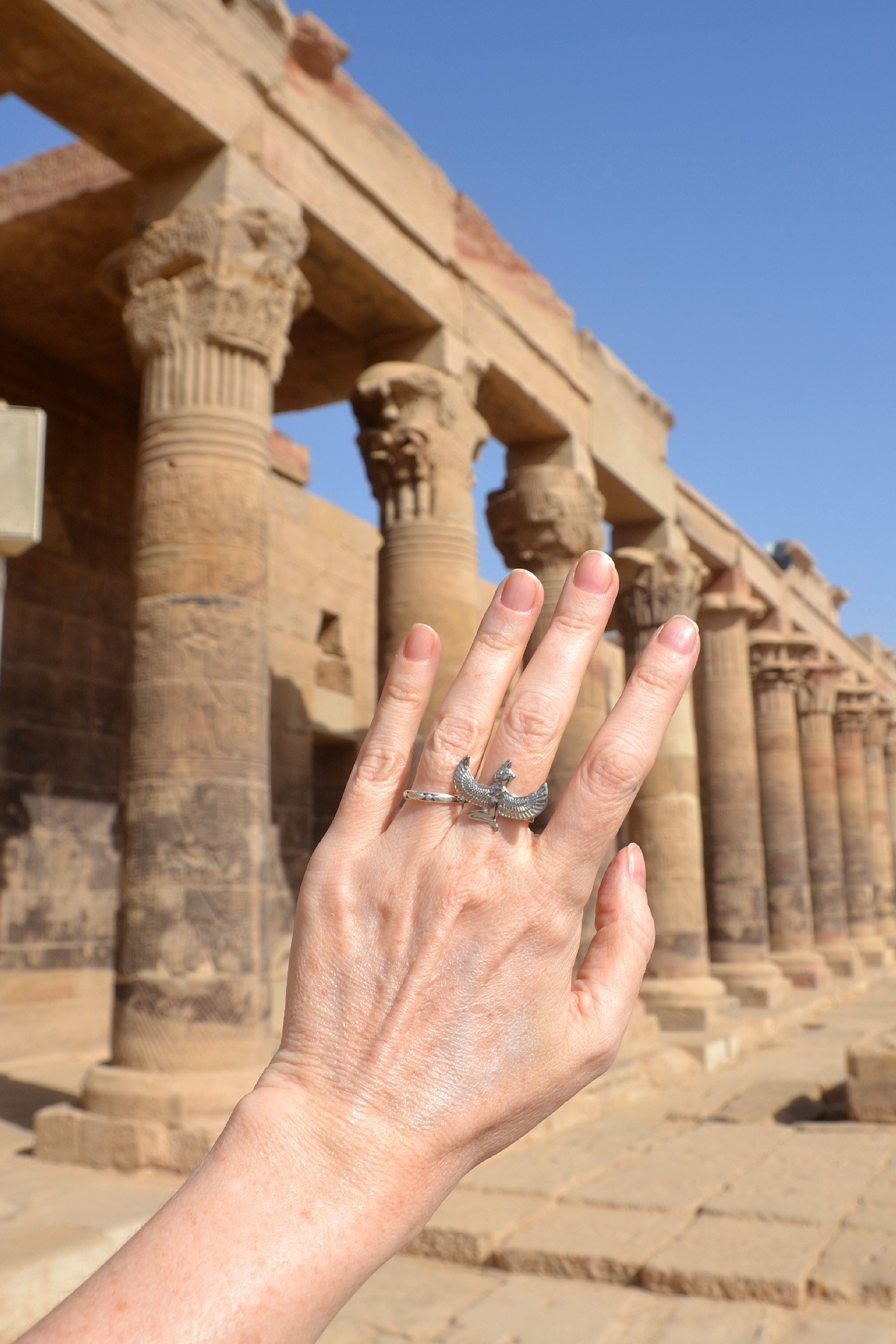

Egypt offers lots of jewelry with Ancient Egyptian themes from ankh rings and amulets to thick Cleopatra-style necklaces.
Some jewelry is more authentic than others. And pieces at Aswan’s souqs range from handcrafted items to cheap Made in China dupes.
Shop the stalls at the marina on your way to Philae Temple for bargain brass jewelry, especially rings with the figure of Isis (the chief deity at Philae).
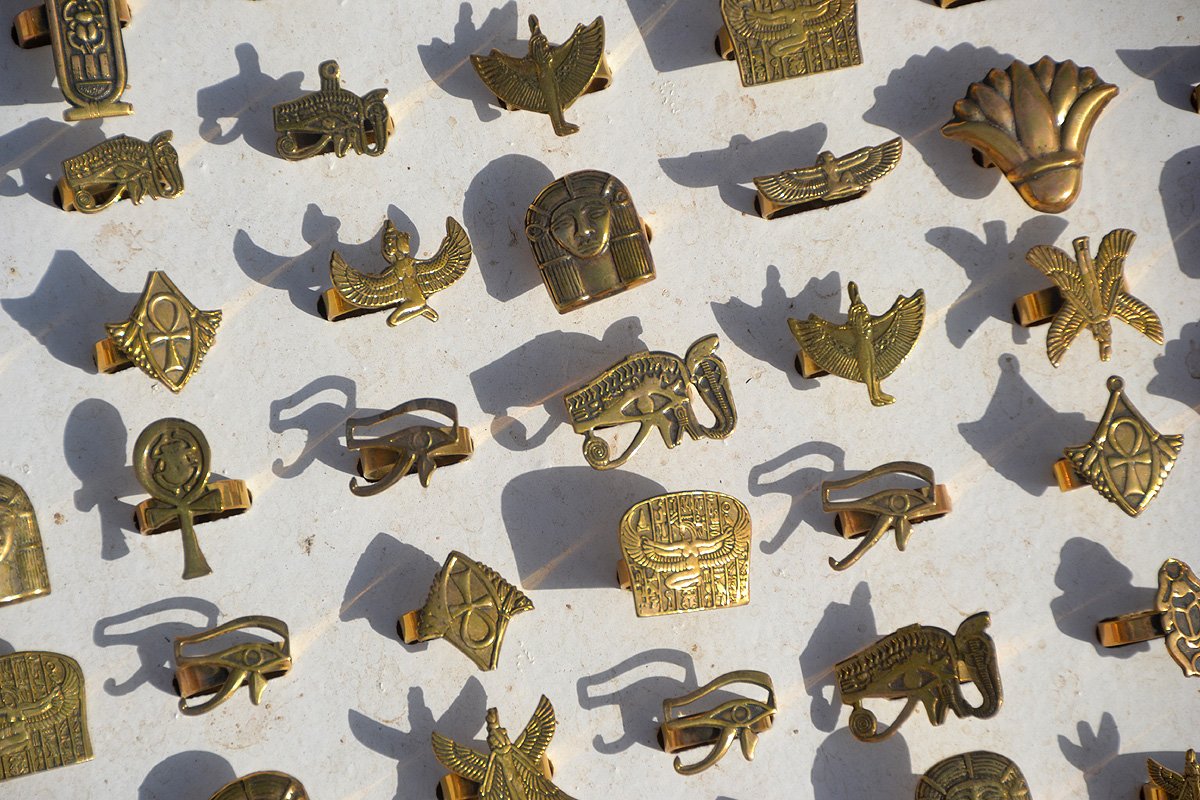

And if you’re looking for gold, Egypt has some of the most affordable prices in the world.
Head to Hanafi Bazaar for 18-carat gold jewelry and custom cartouche necklaces. Shop only at well-established retailers and make sure you get a receipt with the weight of the gold and a certificate of authenticity.
8. Colored alabaster
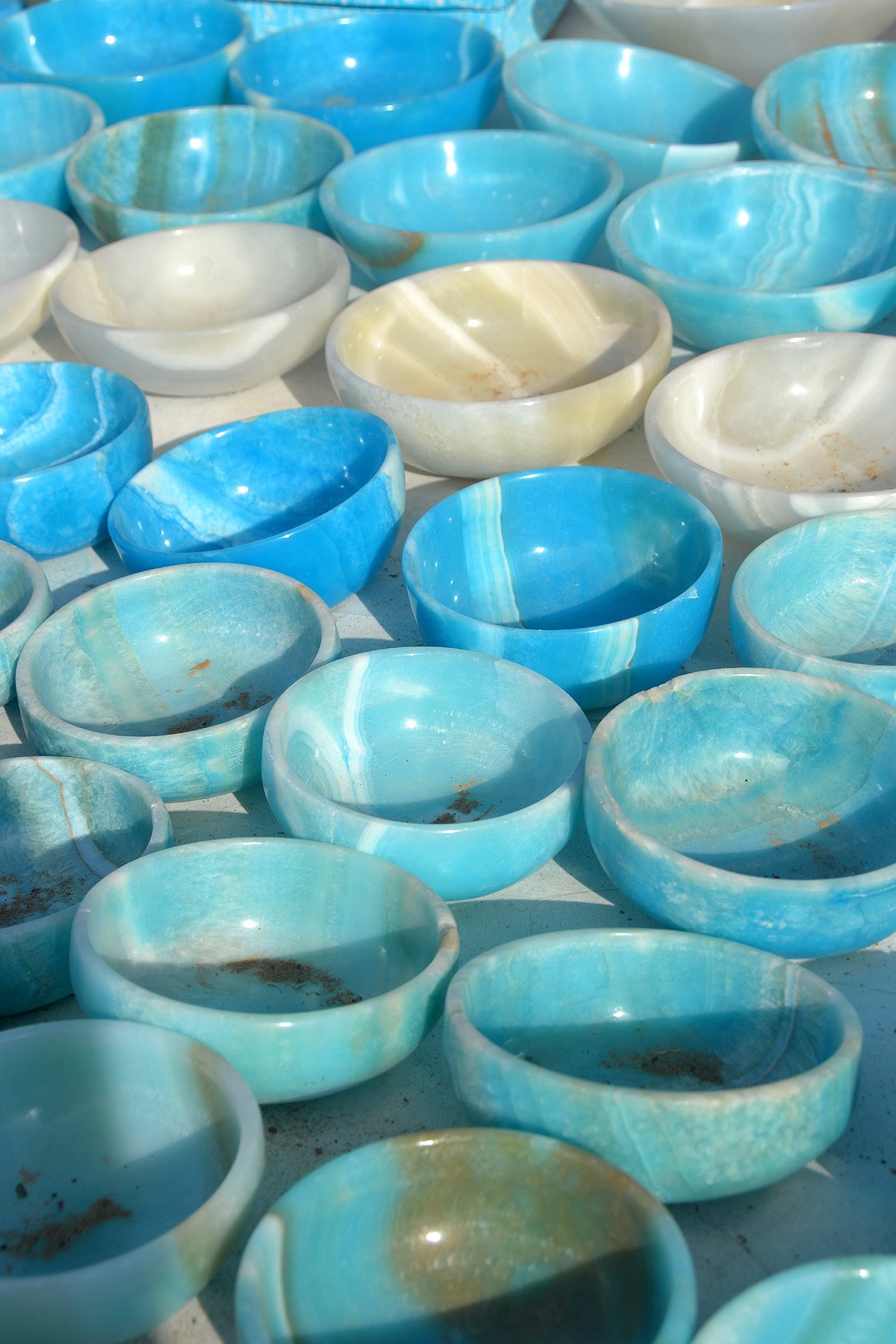

From pastel blue to deep raspberry, Aswan boasts an array of colored alabaster bowls, platters and animal figurines.
Much of the alabaster comes from Luxor then it’s brought into Aswan and sold across local souqs.
Original alabaster comes in shades that range from light to deep yellow, with natural swirls running through the rock. It’s cut and smoothed by machine into an array of objects.
Colored alabaster is either blue or maroon. It’s made with alabaster that’s been dyed with artificial color – so individual pieces vary widely.
The colored alabaster is NOT food safe, however. The blue and maroon items are decorative and can be used to hold potpourri, jewelry, cosmetics, etc.
9. Pouches
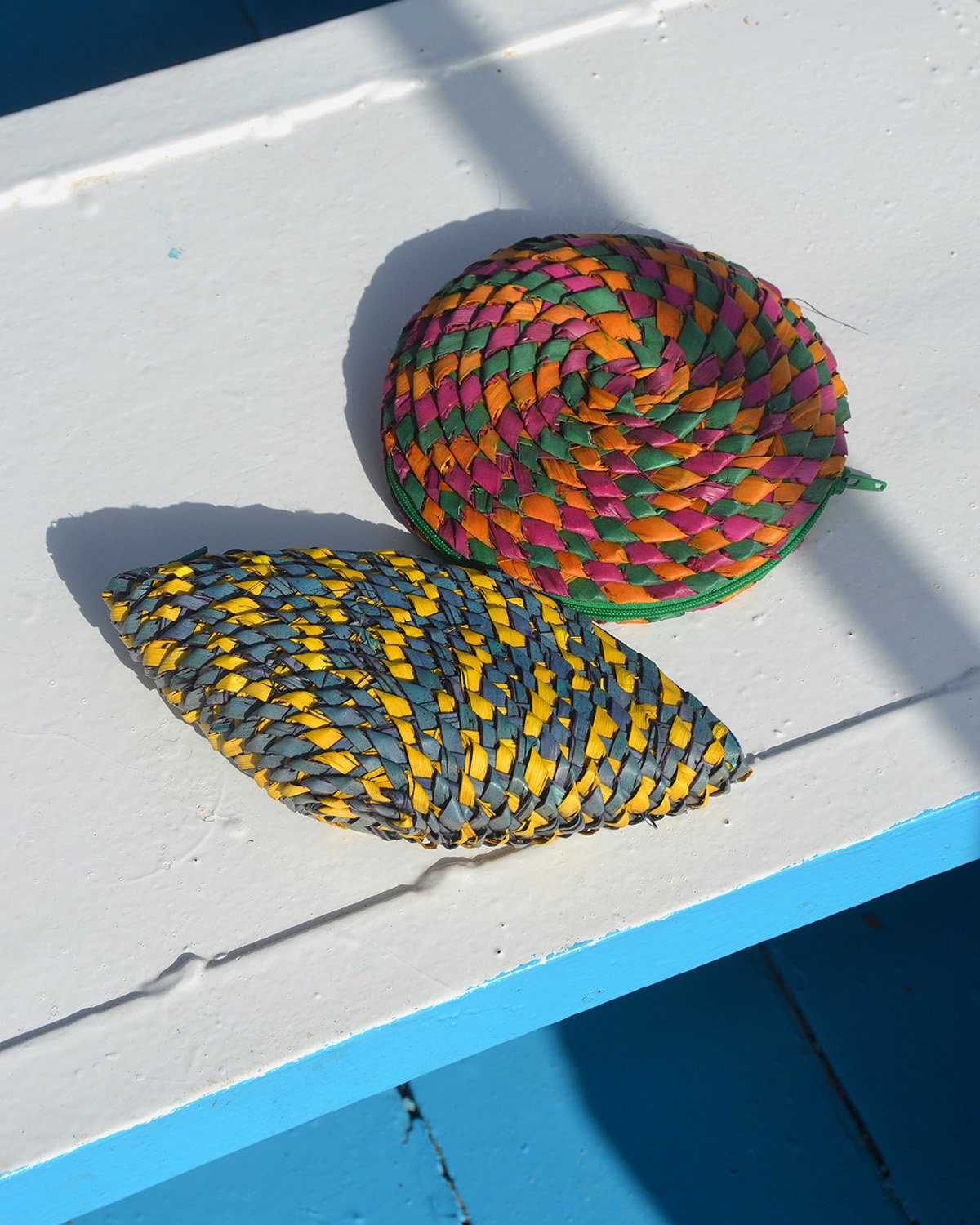

These vibrant pouches make adorable Aswan souvenirs. And they’re practical too – use them to store phone chargers, makeup or anything else floating around loose in your purse.
Aswan pouches are made with dried palm leaves and use materials that would otherwise get discarded after harvest. Local women dye the palm leaves into vibrant colors and then weave them into circular and half-moon pouches.
The Nile around Aswan is known for its luscious plants and palm groves. And these abundant crops, trees and palms have been used in local folk crafts since pre-pharaonic times.
The palm tree is widely used in Nubian culture to create anything from wicker furniture and wall hangings to floor mats and baskets. Almost every scrap of the palm tree is utilized. And these crafts often involve the entire family as Nubian children (especially girls) learn the skills from their mothers.
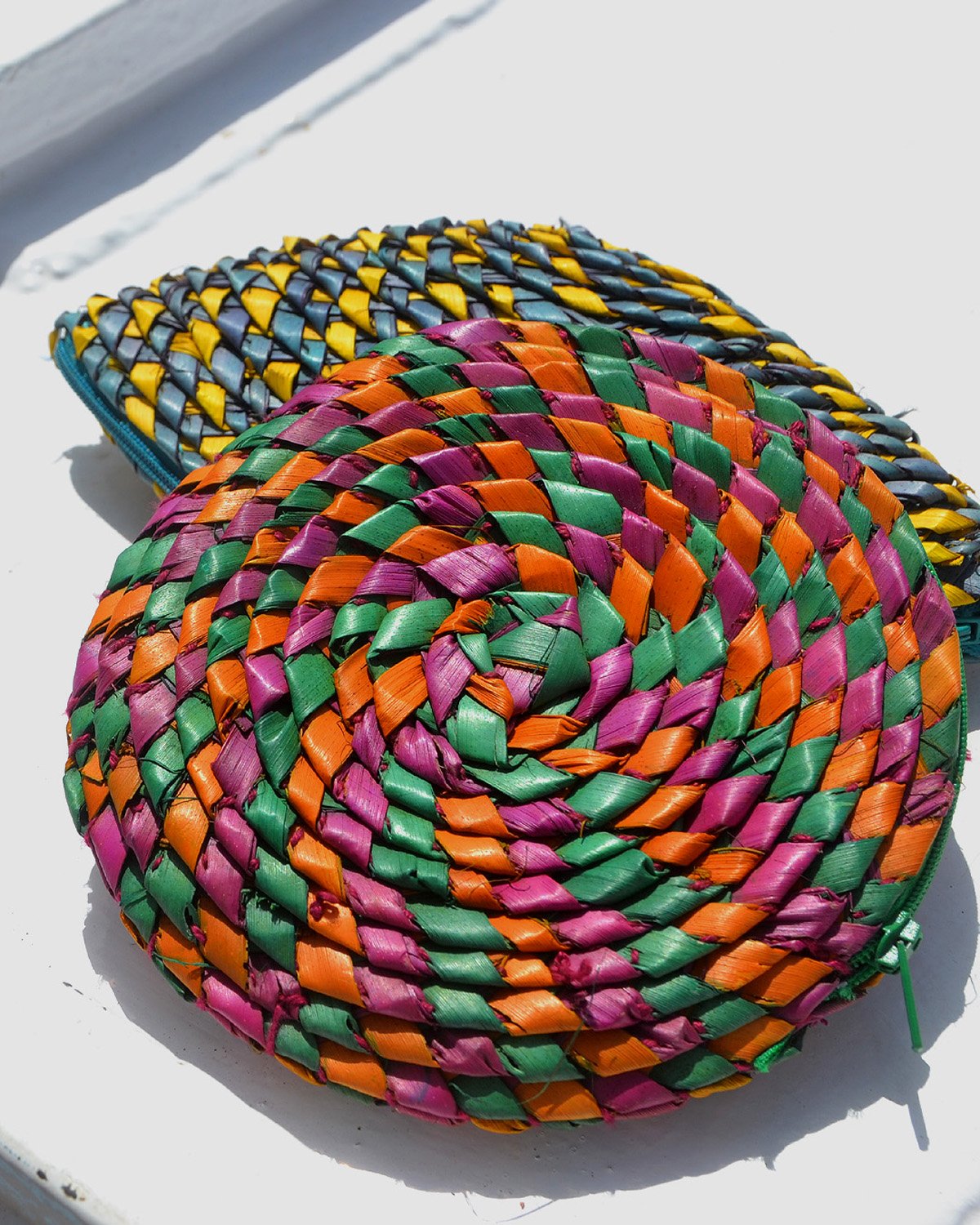

But these days handicrafts in Aswan are under threat amid the influx of cheap Chinese-made souvenirs. Young people rarely want to become craftsmen as they don’t believe the profession is reliable enough to make a decent living.
Though various initiatives aim to keep these traditions alive. And groups of elderly women still weave the vibrant palm leaves together into a myriad of creations.
10. Bead necklaces
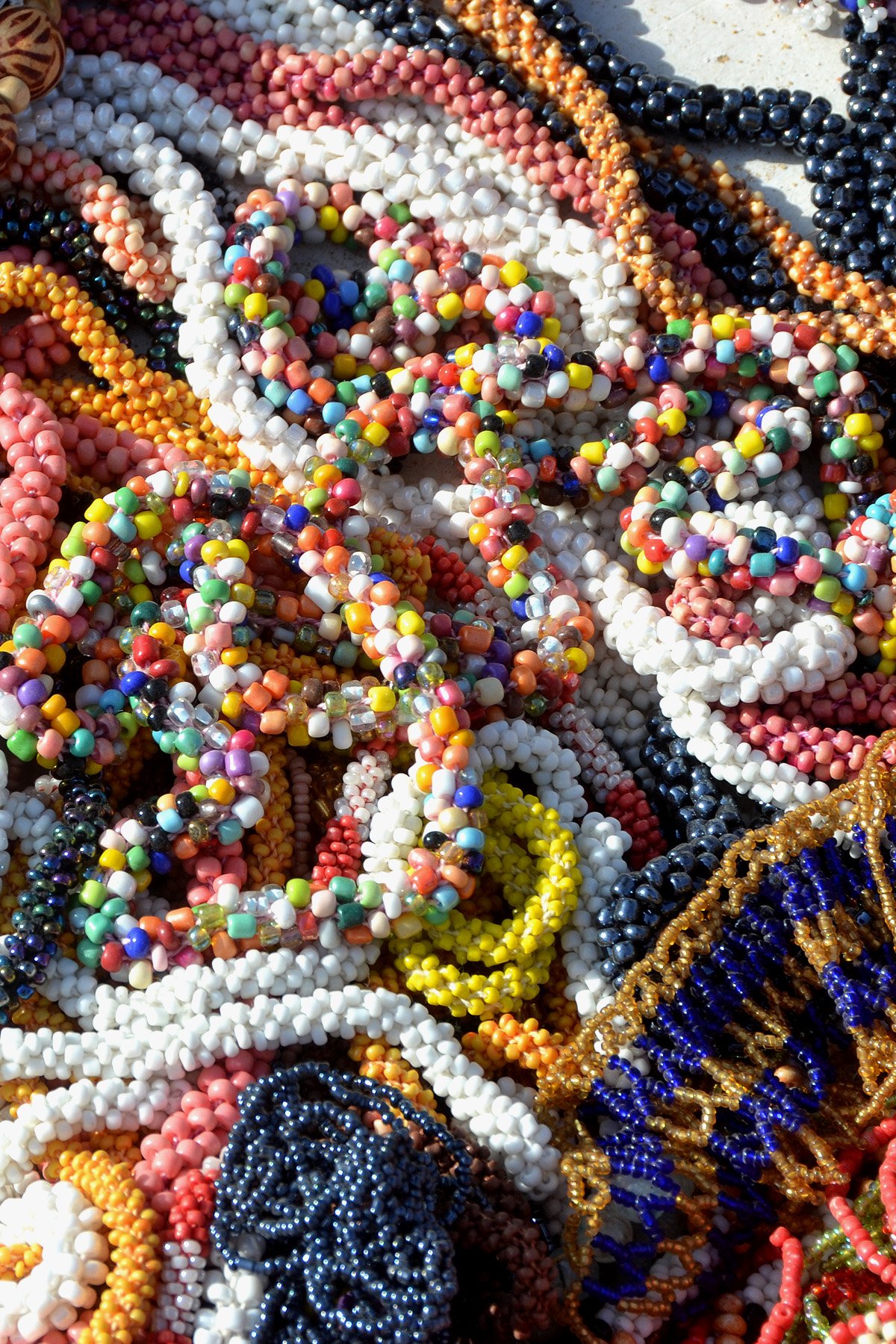

Nubia is well-known for its bold, geometric jewelry – and you’ll find many locally-made pieces at local markets and upscale boutiques.
Nubian jewelry is a unique folkloric tradition that’s unlike any other in Egypt. It boasts an array of influences from pharaonic-style earrings to head ornaments inspired by Byzantine culture.
Jewelry also plays a crucial part in Nubian weddings and makes up a chunk of the woman’s dowry.
And while much of Nubian society has modernized, these jewelry pieces can still be seen on Nubian brides at their lavish celebrations.
And this tradition is kept alive in Aswan’s various souqs.
Head to Hanafi Bazaar for gold pieces. And shop the market at Philae Temple for bright, bargain statement necklaces made with colorful beads.
11. Palm leaf trays
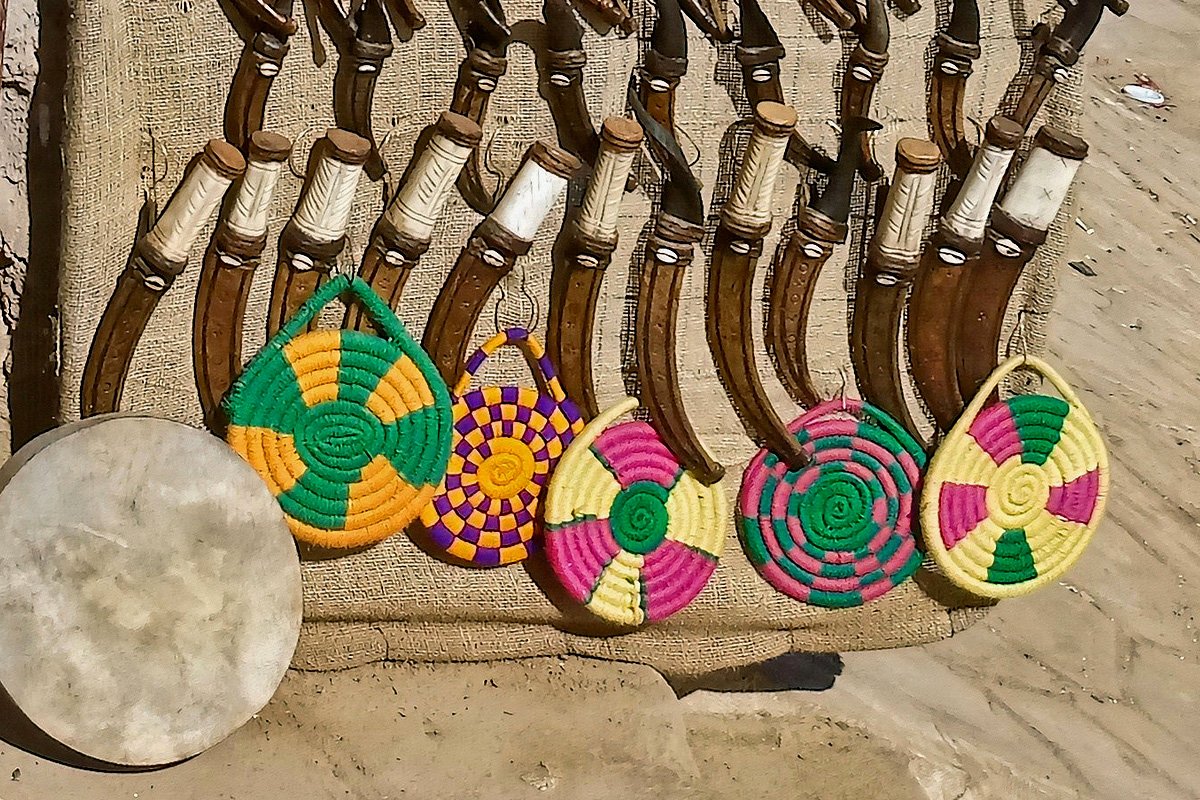

Palm leaf trays are a staple in Nubian kitchens – and they make beautiful souvenirs you can use as platters or wall hangings.
Palm leaf trays are so important in Nubian culture that they’re often included as part of a young wife’s dowry. They range from lavish and elaborate versions that are proudly displayed in Nubian homes and used on special occasions. Other versions are simpler and made for everyday use.
Palm leaf trays are made with dried palm leaves and wheat stalks that are dyed in various colors and woven together.
And they have many uses. The deep trays (kowanti) are used to hold grain, cereal and dates, functioning as wide, shallow baskets. The flatter trays are used to serve treats and pastries – and they’re often reserved for special guests. Smaller trays are used for popcorn and dates.
When they’re not in use, the trays are hung on the wall or put up on display.
You’ll find many different kinds of palm leaf trays at Aswan’s souqs. They range from small to enormous, and from minimal and earthy to bold and colorful.
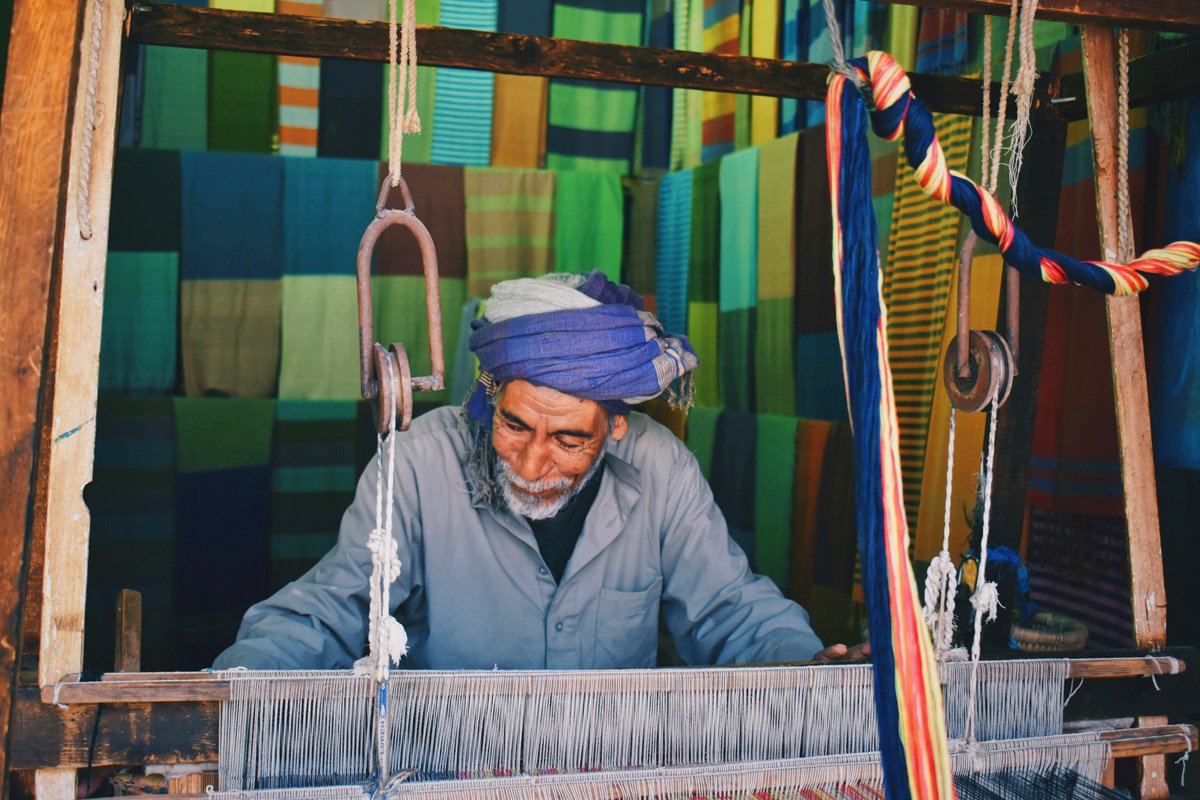

Aswan is known for colorful handicrafts and unique traditions that date back to Ancient Egyptian times.
So skip the kitschy fakes that are Made in China – and get some authentic souvenirs that reflect the region’s fascinating Nubian culture.
Use this guide to find the best things to buy in Aswan.
Whether it’s blue alabaster bowls or vibrant statement necklaces, your souvenirs from Aswan will add color to your life and make brilliant gifts.
I would love to hear from you. What’s on your Aswan shopping wish list?
Heissa Island: Aswan’s Must-See Hidden Gem
15 Best Things To Do In Aswan (A Local’s Guide)
10 Amazing Things To See At Philae Temple, Aswan
An Ultimate Nile Cruise Guide (And 8 Essential Tips!)
Pin it:
